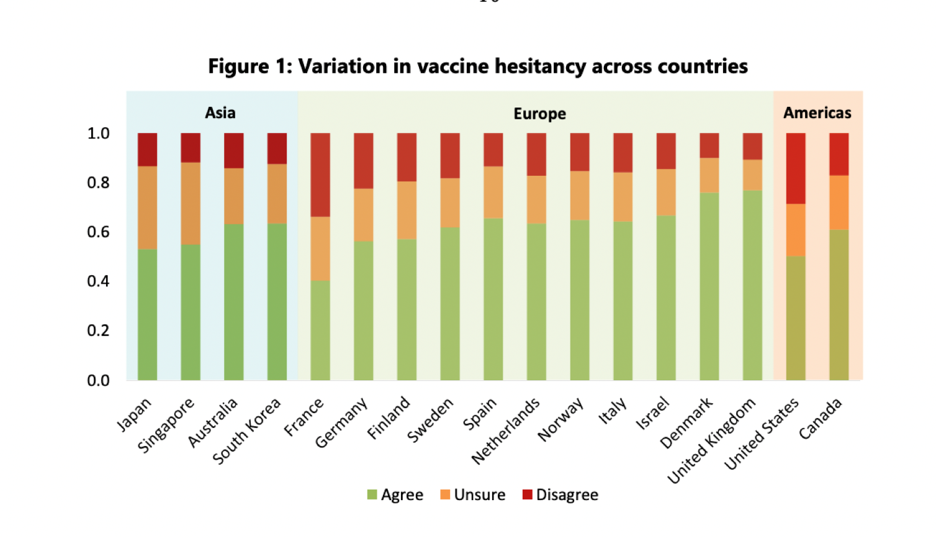Bound by Irrationality: It's all in your head!
Let’s get back and see how your mind plays you in ways you’ve probably never anticipated!
In Pride and Prejudice, the opening to my trilogy, I attempted to explain how certain heuristics and biases can affect our cognitive dimension of risk perception. How far then, do our emotions influence our perception of risk? And how do these decisions driven by emotions affect the economy?
Vaccines have been central to the health and wealth of economies. Some economists might even argue that they are essential public goods just like clean air and drinking water! Have you ever wondered what a market for vaccines might look like? Is it a perfectly-clearing market? No, it isn’t. And here’s why.
Although vaccines have been provided free-of-cost in many countries during the pandemic, there are still non-monetary costs and benefits involved in immunization that generate massive positive externalities - vaccinating one person will reduce the likelihood of others contracting the virus, which results in external health benefits enjoyed by all. It follows then that the more who get jabbed, the merrier it is for society.
In early 2021, however, the world saw a substantial proportion of its people polarized in their opinions about vaccines and their efficacy against combating the coronavirus. For over two centuries, vaccines have been extensively researched and developed to shield us from contracting many diseases. So if we’ve seen success in science, why do many still object to getting vaccinated?
The underconsumption of vaccines, despite their proven potency, has caused the “vaccine market” to fail repeatedly. The malady? Vaccine Hesitancy. The World Health Organization (WHO) named vaccine hesitancy as one of the top 10 threats to global health even before the COVID-19 pandemic. The rise in anti-vaccine sentiments dates back to the 19th century, spreading across Europe and the U.S. Objections based on religious, moral, and personal grounds were compounded with a lack of trust in government authorities. A potential reason for this could have been the lack of access to reliable information regarding the efficacy and success of vaccines in the 19th and early 20th centuries. Isn’t it paradoxical that despite the affluence of technological feats and information in the 21st century, vaccine hesitancy persists as a major challenge during the COVID-19 pandemic?
A study published by the International Monetary Fund (IMF) showed that under 40% of the population in France and less than 60% of the population in the U.S. were willing to take a COVID-19 vaccine in the early stages of the pandemic. The field of economics suggests we are rational agents, so shouldn’t people lay greater emphasis on the risks of hospitalization or even death due to COVID-19 than on the side-effects of getting jabbed?
Turns out, matters of the mind aren’t that simple: we are more likely to give in to our emotions than appeal for rationality. Our minds constantly seek mental shortcuts or “heuristics” which result in us approaching complex problems with practical yet dumbed-down methods that don’t necessarily give optimal results. In particular, the affect heuristic allows us to reach conclusions quickly by relying on our emotions rather than concrete information. Essentially, our emotions cloud our abilities to think rationally and judge risks and rewards. These emotions drive irrational decision making which can explain the underconsumption of vaccines by anti-vaxxers who deprive society of the positive externalities of immunization.
Just as consumers may base consumption decisions regarding their future purchases on their experiences and satisfaction with a particular company or product, anti-vaxxers base their decision on not getting jabbed on experiences or strong beliefs that they might have developed in the past.
Vaccine hesitancy, as shown in figure 1, was highest in France and the U.S. where a larger share of their populations disagreed with getting vaccinated. Could these countries’ histories of debilitating trust in vaccines and health care systems have been a factor in determining today’s anti-vaccine sentiment against the COVID-19 vaccine? Turns out they do.
Let’s visit France, where one in three French citizens doubt the safety of vaccines, as reported in 2018. Vaccine hesitancy may be a result of deep-rooted political mistrust throughout the country’s history. In the 1880s, Louis Pasteur’s efforts to advance modern immunology were met with great criticism by animal rights associations and suspicion in the public eye. Scientific research became an object of public satire. Recent history didn’t help: in 2009, the French Government overestimated the spread of the H1N1 epidemic and ordered too many vaccines that ultimately had to be incinerated — a massive waste of national funds that intensified public distrust in their government. Vaccine mandates for newborns imposed by the Ministry of Health in 2018 deprived parents of their liberty to choose for their children, furthering the discontent with the Government and vaccines in general. All these political debacles and poor management during previous health crises may have developed French citizens’ “affect heuristics”: their mistrust in historical scientific and healthcare institutions has shaped France’s COVID-19anti-vaccine sentiment.
Similar historical complications have impacted U.S. citizens’ affect heuristics. A 2021 survey revealed that 77% of families refuse vaccines due to their fear that vaccinations cause autism — a misconception of many Americans because of a false study in 1999 that linked a vaccine to autism. In addition to this, there have been historic concerns about infertility, disease, disability, and infringement of personal liberty due to vaccines. Whether it was mandatory vaccination laws, the infamous Tuskegee Syphilis Study or other instances of false journalism and media portrayal, America’s anti-vaccine sentiment has been shaped by history, thus rendering many Americans victims of the affect heuristic.
To correct market failures of vaccine under consumption, wouldn’t the obvious solution be to provide anti-vaxxers with proper scientific evidence that eliminates their skepticism towards vaccines?
Today, the reports of serious side effects of the COVID-19 vaccine are extremely rare. The Vaccine Adverse Event Reporting System (VAERS) reported that only 0.0019% of the population tested underwent severe side effects or died. In most cases, deaths are not even directly linked to the vaccines. Despite government efforts to spread valid information regarding the efficacy and success of the COVID-19 vaccine, these studies still can’t overcome the affect heuristic of many vaccine-skeptic populations. People’s emotions and exposure to adverse experiences with vaccines affect their abilities to rationally respond to the facts about vaccine efficacy and the logical appeals made by the health care workers and organizations. People with deep-rooted and irrational fears regarding vaccines that were a result of negative experiences in the past are more likely to turn a blind eye to any new attempts made to debunk their flawed perception. This is because our mind is vulnerable to another cognitive bias — the confirmation bias.
A confirmation bias exists when we process information by seeking or interpreting information that is consistent with our own beliefs, and the broadcasts on social media and TV channels let us fall for these biases. If you are someone holding a strong political stance, do you see yourself leaning towards a specific media channel? A study revealed that Republican voters tend to watch FOX news while Democrats prefer CNN. People tend to dismiss channels and media sources that do not conform with our existing beliefs. Since we’ve developed beliefs or strong emotions, our minds find it difficult to resist the need for constant confirmation. It is this need to constantly favor our own “truth” that interferes with our perception of risk when it comes to making decisions.
By giving in to the confirmation bias, anti-vaxxers and skeptics will selectively seek data that affirms their beliefs. They are more likely to follow media sources that highlight “the side-effects and disadvantages of the COVID-19 vaccine” rather than searches that involve “the efficacy of vaccines and need for vaccination against COVID-19”. Through such selective exposure to information, they are trapped in an endless loop of affirmation on social media that reinforces their bias against vaccines — and the social media algorithms don’t help break this bias. Due to this, they underestimate the risks of not getting vaccinated or may even contribute to spreading false information exacerbating anti-vaccine sentiment in the general public — even conspiracy theories, like the claims that governments include microchips in COVID-19 vaccines in an attempt to invade privacy! This claim could have been a result of a transfer of heightened suspicion in the 1970s amidst the civil war when people believed vaccines to be government weapons.
@DoggymusPrime/twitter
While it may seem justified to pick on people’s irrationality for opposing vaccination, it is important to understand why they choose to make that decision. Our mind, in many instances, latches on to emotions of the past that may ultimately influence decision-making in the present. Vaccine hesitancy is one such instance where peoples’ emotions dictate their decision to get vaccinated (the affect heuristic) and encourage them to seek information that conforms to their anti-vaccine sentiment (confirmation bias).
In knowing the vulnerabilities of our minds and how they influence our perception of risk, we can avoid making irrational decisions that may have massive monetary and health implications. Every COVID-19 case comes at a cost. A study projected that COVID-19 treatment for the uninsured would save between $13.9 billion to $41.8 billion. Vaccine hesitancy would cost the economy billions due to a spike in healthcare costs.
Don’t leave the fate of your lungs to the mercy of your biased mind!
The good news is that vaccine hesitancy has plummeted since 2021, but it hasn't been an easy process for public health officials and governments. While the people might have failed in the vaccine market due to cognitive biases, how have governments fared during the pandemic? Stay tuned to “Pyrrhic Victory”, the next article to explore the causes and pitfalls of biased policy-making.
This was about our emotions, diplomacy, and vaccine hesitancy impact our perception of risk, but have you wondered what the brain’s role is in interpreting external information? To know more, read the first part of this series, “Pride and Prejudice”.



